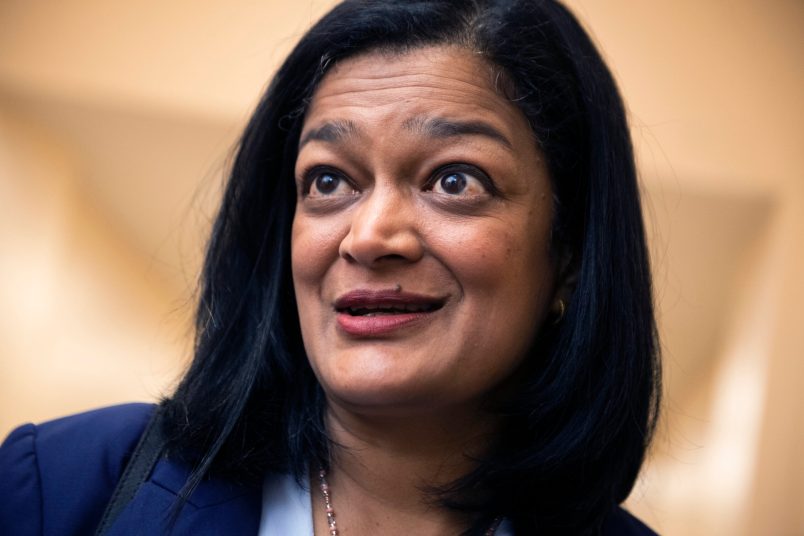Rep. Pramila Jayapal (D-WA), chair of the Congressional Progressive Caucus, on Tuesday outlined her support for shortening the duration of programs within the reconciliation package rather than nixing any of them out to bring down its price tag amid centrist senators’ complaints over its $3.5 trillion topline.
During an interview on the podcast “The Takeout” with CBS’ Major Garrett, Jayapal was asked whether all five of progressives’ priorities in the reconciliation package can fit within a smaller topline of $2 trillion — a figure that some Democratic leaders have suggested.
After stressing that the final topline figure of the reconciliation package has yet to be determined, Jayapal explained why progressives prefer reducing the duration of programs in it rather than eliminating any of them fully to bring down the overall price tag.
“We do believe that you can significantly cut down on the price tag by funding some of these programs for a shorter period of time,” Jayapal said. “Make sure that the benefits are universal and accrued to people immediately — not in three years or five years — but something that people can tangibly feel right away. And then deal with the extension of those programs down the road when people see how transformative they are.”
Jayapal said that progressives believe that is the best move in order to not sacrifice one provision over another in the sweeping “human infrastructure” legislation.
“So that’s what we believe is the best thing because we can’t pit childcare against climate change. We can’t pit home and community-based care against housing. That just doesn’t make sense,” Jayapal said. “And the reality is each of thee programs serves a slightly different set of constituencies.”
Jayapal’s latest remarks appear to accept the reality that centrist senators will likely force the reconciliation package’s price tag down, despite her reported remarks to President Biden last week saying his newly proposed range of $1.9 trillion to $2.3 trillion amid negotiations with moderate Democrats was “too low” and that she “would really like to be closer to three.” Jayapal, however, said she wasn’t “drawing any red lines” in their discussions.
Jayapal’s comments on Tuesday were also issued hours after House Speaker Nancy Pelosi (D-CA) appeared to embrace the idea of shortening the duration of programs within the reconciliation package rather than chopping any of them out altogether during a press conference earlier Tuesday. Pelosi told reporters that she is “very disappointed” that the reconciliation package will have to be trimmed down from its original $3.5 trillion price tag in order for centrist Sens. Joe Manchin (D-WV) and Kyrsten Sinema (D-AZ) to come around to supporting it.
“We’re still talking about a couple trillion dollars — but it’s much less,” Pelosi said. “Mostly we would be cutting back on years and something like that.”
While Manchin has proposed a topline of $1.5 trillion, Sinema has remained tight-lipped on her red lines for the reconciliation package.
Sen. Bernie Sanders (I-VT) has reminded reporters that Democrats are still unclear on where Manchin and Sinema’s hard lines are.
“The time is now long overdue for Senator Manchin and Senator Sinema to tell us exactly… where do they want to cut?” Sanders said on a press call with congressional progressives on Tuesday. “Do they want to cut childcare, do they not want to negotiate with the pharmaceutical industry and have Medicare negotiate prescription drug prices? They don’t want paid family medical leave? Do they not want us to be aggressive in terms of climate or affordable housing or community colleges? What do they want?”
Watch Jayapal’s remarks below:







That is absolutely brilliant. We get the programs and we get to try them out for 8 or 9 years…
This was the ACA strategy. Give the people what they need and want, and then try to take it away from them GOP.
It’s pretty clear Manchin favors carbon. If he would settle for a blue hydrogen path up to, say, 2050, and stop with the coal silliness, it could still preserve jobs on the Marcellus Shale. Still, it’s a relatively low job production field, and many of the jobs in the oil & gas industry are low-skilled, as is hydrocarbon extraction generally. I don’t think he opposes caring for the elderly or daycare subsidies. Indeed, the Democrats should be touting the fact that this bill helps deal with labor scarcity, a predictable consequence of pandemics.
It might be a good way to go.
This seems like a good plan. Now sell it and stop talking about Sinema and Manchin. Let Joe Biden, Schumer and Pelosi deal with those two. I am sick to death of hearing about them especially from someone who has her House seat for life if she wants it. You need all Dems in the House to support this as well and yes some of those Dems represent WA state.